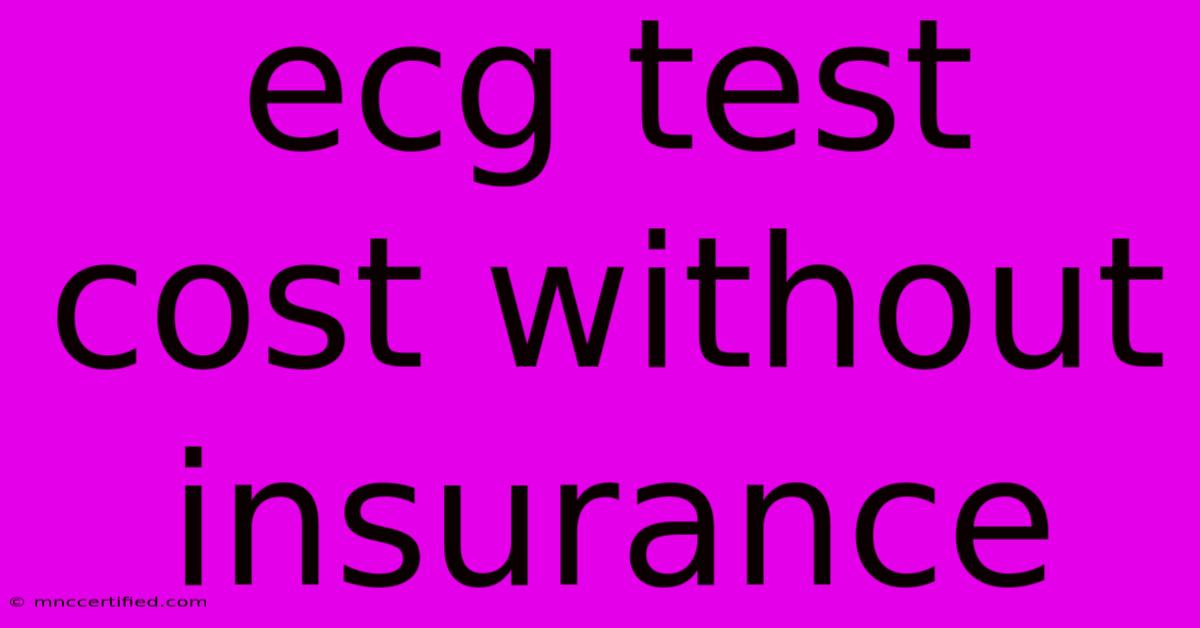Ecg Test Cost Without Insurance

Table of Contents
ECG Test Cost Without Insurance: A Comprehensive Guide
An electrocardiogram (ECG or EKG) is a simple, non-invasive test that measures the electrical activity of your heart. It's a crucial diagnostic tool used to detect a wide range of heart conditions, from arrhythmias to heart attacks. But how much does an ECG test cost without insurance? The answer, unfortunately, isn't straightforward. This guide breaks down the factors influencing the price and offers strategies for finding affordable ECG testing.
Factors Affecting the Cost of an ECG Test Without Insurance
Several factors contribute to the variability in ECG test costs without insurance:
-
Location: The geographical location significantly impacts pricing. ECG costs in urban areas tend to be higher than those in rural settings due to higher overhead and operational costs. Costs vary widely between states and even between cities within the same state.
-
Facility Type: The type of healthcare facility where you get the test influences the price. Urgent care clinics, hospital emergency rooms, and independent diagnostic testing facilities all have different pricing structures. Emergency room visits, for example, will typically be the most expensive option. Independent clinics often offer more competitive pricing than hospitals.
-
Additional Services: The total cost might include additional services beyond the ECG itself. This could involve a physician's consultation to interpret the results, additional tests ordered based on the ECG findings, or even administrative fees.
-
Out-of-Pocket Expenses: If you're uninsured, you'll be responsible for the entire cost of the ECG test, including any associated fees. This is often a significant expense, which is why understanding the pricing beforehand is crucial.
Average Cost Range of an ECG Test Without Insurance
While a precise number is impossible to give, you can expect the cost of an ECG test without insurance to range from $50 to $300 or more. This wide range underscores the importance of shopping around and comparing prices.
Strategies for Finding Affordable ECG Testing
-
Shop Around: Contact multiple facilities – urgent care centers, independent diagnostic testing facilities, and even cardiologist offices – to compare prices. Ask for a price quote before scheduling your appointment to avoid surprises.
-
Negotiate: Don't hesitate to negotiate the price, especially if you're paying out of pocket. Many facilities are willing to work with patients who demonstrate financial hardship.
-
Consider Discounted Clinics: Search for clinics or healthcare providers that offer discounted rates for cash-paying patients. Some community health centers might provide more affordable options.
-
Check for Financial Assistance Programs: Some organizations and charities offer financial assistance for medical expenses. Investigate whether you qualify for any such programs in your area.
-
Look for Free or Low-Cost Clinics: In some areas, free or low-cost clinics may offer ECG services, particularly if you meet certain income requirements.
Understanding Your ECG Results
Once you have your ECG results, it's crucial to understand what they mean. While the ECG itself is a relatively inexpensive test, misinterpreting the results can lead to further, more expensive, and potentially unnecessary tests. Always discuss the results with a qualified healthcare professional. They can help you understand any abnormalities and recommend appropriate next steps.
Conclusion: Planning for ECG Costs
An ECG test is often necessary for diagnosing heart conditions. While the cost without insurance can be substantial, proactive planning and research can help you find an affordable option. Remember to compare prices, negotiate if possible, and explore financial assistance programs to manage the expense effectively. Your heart health is paramount; don't let cost be a barrier to receiving the necessary medical care.

Thank you for visiting our website wich cover about Ecg Test Cost Without Insurance. We hope the information provided has been useful to you. Feel free to contact us if you have any questions or need further assistance. See you next time and dont miss to bookmark.
Featured Posts
-
Arsenal Defeat Nottingham Forest 3 0
Nov 24, 2024
-
Brighton 2 1 Bournemouth 2024 Game Analysis
Nov 24, 2024
-
Leicester City Chelsea Final Score And Result
Nov 24, 2024
-
Byu Vs Arizona State Live Stream Guide
Nov 24, 2024
-
Premier League Everton 0 0 Brentford Red Card
Nov 24, 2024